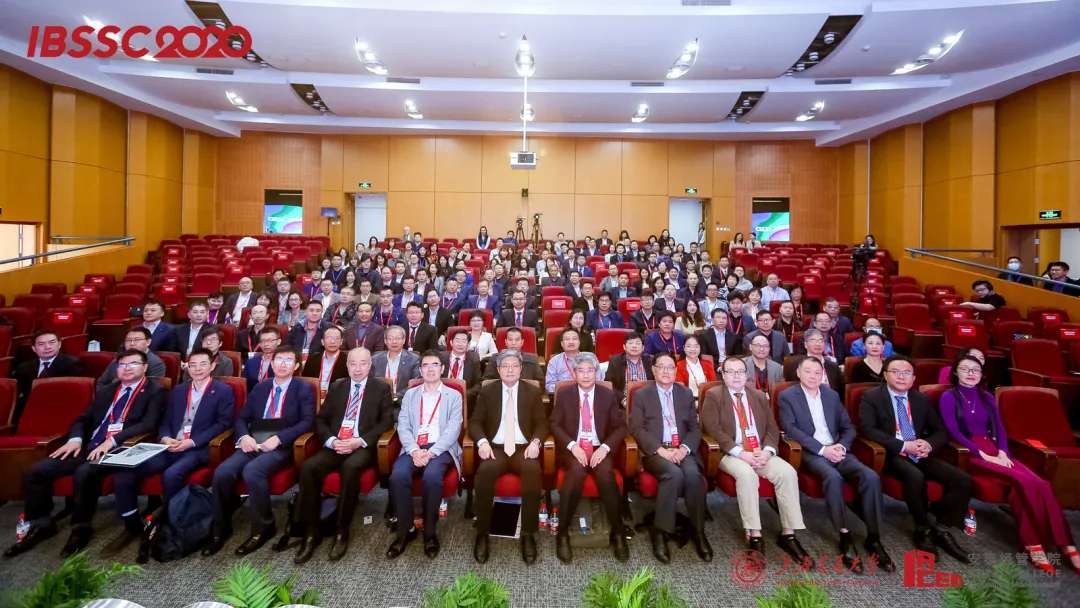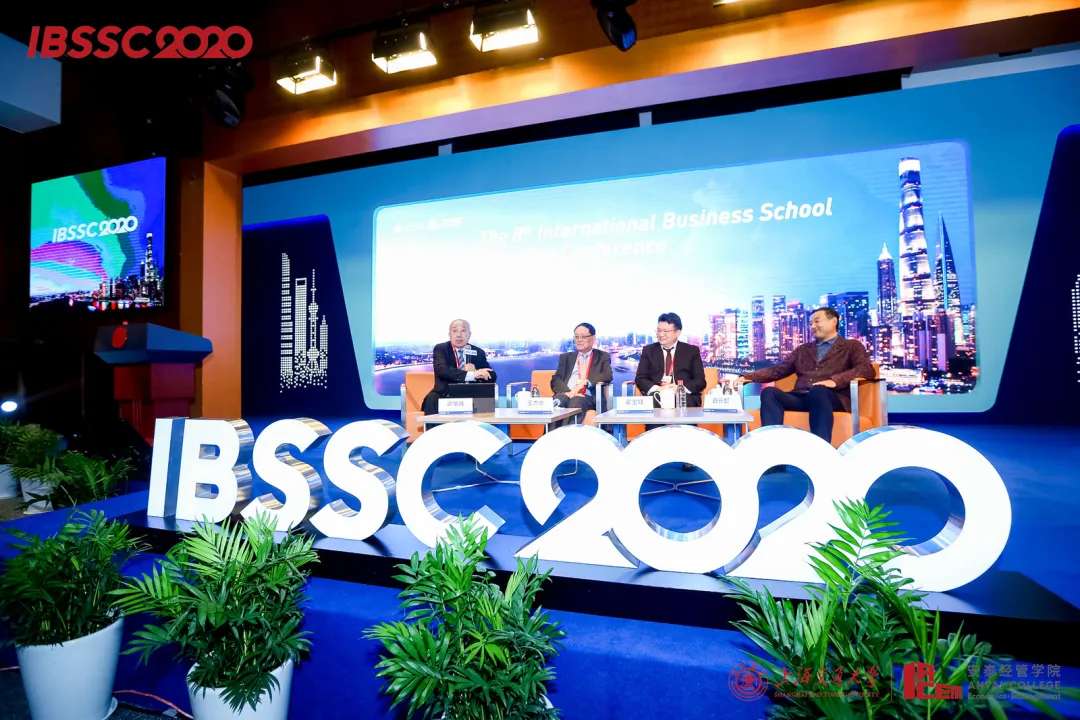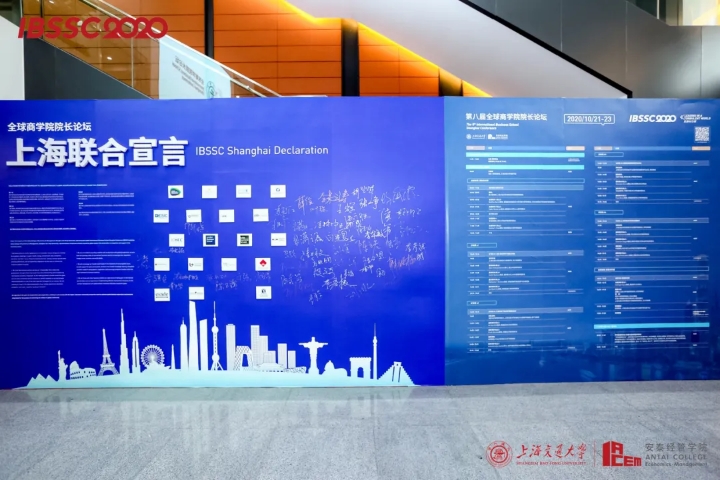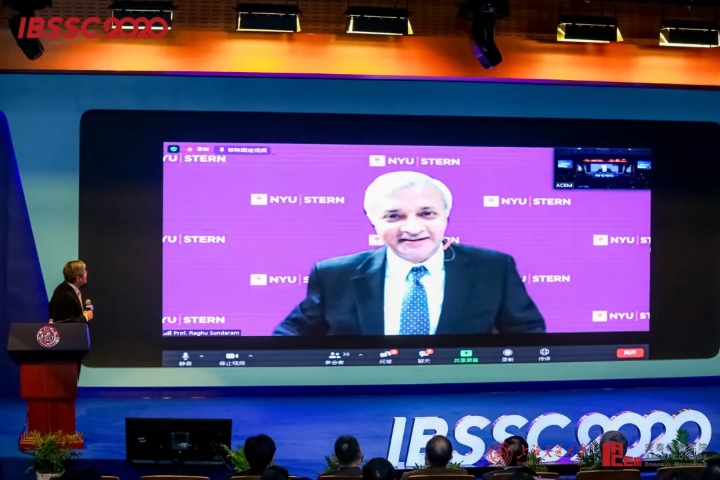Shanghai Declaration Signed by ACEM and Nearly 200 Business Schools Around the World: Under Uncertainty, International Academic Cooperation Encouraged Among Researchers
Publisher : MBA Office Feb.06,2021
Foreword
“We believe that the trend of globalization is irreversible.” As of 18:00 on October 22, 195 business schools from home and abroad reached a consensus and signed a Shanghai Declaration. The first article of the Declaration shows the determination to promote globalization.
Nowadays, the international environment is changing. How to strengthen the international cooperation of business schools and cultivate business leaders under the changing environment? On October 22, the eighth International Business School Shanghai Conference (IBSSC) hosted by Antai College of Economics & Management (ACEM), Shanghai Jiao Tong University (SJTU), was held in the Xuhui Campus of SJTU. In the conference, over 400 deans from top business schools around the world signed and jointly released the IBSSC Shanghai Declaration to promote international cooperation and exchange in business education. Before that, the deans of business schools of famous American universities, including Yale University and Massachusetts Institute of Technology, also expressed their support for globalization in different ways.
Business schools can play an irreplaceable role in advancing globalization through enhancing mutual trust and understanding and strengthening international economic integration. This IBSSC Shanghai Declaration proposes that: We will commit ourselves to promoting international cooperation and exchange in business education, participate in the resolution of various global issues, promote cross-border knowledge sharing; share with other business schools our experiences of taking part in international partnerships and our experience of implementing effective improvement measures, for the common development and advancement of business education around the globe.
Yang Zhenbin, the secretary of the Party Committee of SJTU, said that Shanghai Jiao Tong University has always regarded internationalization as one of the most important strategies. In recent years, SJTU has made remarkable achievements in international education, injected new vitality into the new development of the university, and accelerated the process of building a world-class university and world-class disciplines. SJTU is committed to cultivating elite talents with "world vision and feelings for home and country", who can "melt the past, cast the present, and design the future”.
Professor Chen fangruo, the dean of ACEM, said that despite of the tide of de-globalization, business schools, as the cradles of cultivating business elites, play a role in cultivating business leaders and promoting industry cooperation and exchange. Human beings are currently facing global challenges in public health, energy, environment, food, economics, education, and other issues. Globalization aims at the integration of global resources, with division of labor and cooperation, and the resultant force formed by cooperation is conducive to meeting the common challenges of mankind.
“Uncertainty is indeed a clear feature of the current world, and prediction is difficult. Uncertainty makes prediction more difficult.” Under the background of COVID-19 pandemic worldwide, Geoffrey Garrett, dean of the USC Marshall School of Business and former dean of the Wharton School of the University of Pennsylvania, believed that the leadership under uncertainty should bear more responsibilities, including more humanistic responsibilities, which means that diversified development and environmental protection should be considered more in the future development process.
In the face of various uncertainties, Josep Franch Bullich, dean of ESADE Business School from Europe, believed that the business environment requires people to quickly adapt to changes and respond to them, and provides new challenges and ideas for the development of business education -- to strengthen sustainable exchanges and support globalization hand in hand.
In this forum, more than 400 business school deans from home and abroad gathered at ACEM, to deeply discuss the role of business school in guiding the future development of enterprises and business education under the turbulent and constantly changing environment in an online and offline way, focusing on four topics: "cultivating business leaders under the changing environment", "international cooperation of business schools under the changing environment", "transnational business education and economic globalization", and "business schools and sustainable development education". The main forum was broadcasted live on Internet through 12 media and attracted the attention of nearly 2 million netizens.
Led by Antai College of Economics & Management, Shanghai Jiao Tong University, by 6:00PM, October 22, 195 business schools from home and abroad had signed the Shanghai Declaration, showing their determination to promote globalization.
全球商学院院长论坛上海联合宣言
IBSSC Shanghai Declaration
在由上海交通大学安泰经济与管理学院主办的“第八届全球商学院院长论坛”会议期间,来自世界各地的顶尖商学院的院长们,为支持如下共识,签署此联合宣言:
Under the auspices of the Antai College of Economics & Management, Shanghai Jiao Tong University, and during the eighth International Business School Shanghai Conference (IBSSC) hosted by Antai College of Economics & Management, Shanghai Jiao Tong University, representatives of business schools around the globe endorse this declaration in recognition and support of the following values.
第一条
Article 1
我们相信经济全球化是不可逆转的未来发展趋势。人类在公共卫生、能源转型、环境保护、可持续的经济繁荣、知识教育、粮食安全等多方面,面临着全球性的前所未有的挑战。全球商学院用应携手促进跨国间的相互理解、求同存异、加强合作方可有效解决这些问题,增进全人类的集体福祉。
We believe that the trend of globalization is irreversible. Human beings are currently facing global challenges in public health, energy, environment, food, economics, education, and other issues. Properly handling diversity, seeking common ground while resolving differences, and strengthening cooperation are the ways to enhance the collective welfare of society.
第二条
Article 2
我们相信,商学院在推动全球经济整合和商务往来,增进世界各国的理解和互信方面,有不可替代的作用。我们将坚定不移地推动商学教育的国际合作与交流,并将继续在学院治理、教学项目、课程设置、学生培养、师资发展、学术研究等的国际化方面进行投入。
We trust that business schools can play an irreplaceable role in advancing globalization through enhancing mutual trust and understanding and strengthening international economic integration. As the leading business schools around the globe, we have been committed and will continue to commit ourselves to carrying forward internationalization as one of the most important strategies for our schools. We will continue to invest in the internationalization of our schools’ governance structure, programs, curriculum, students, faculty and research.
第三条
Article 3
我们致力于培养具有全球化视野的,且具有多元文化理解能力的学生,以适应日益密切的国际商务往来和经济全球化的需要。
We are committed to providing students with an education with global perspectives, so as to meet the growing needs of international business and the increasingly inter-dependent linkage across countries around the globe.
第四条
Article 4
我们将继续鼓励科研人员参与国际学术合作,推动旨在解决各种全球性问题的研究,为政策制定建言献策,促进跨境知识共享,加强产学研合作,支持在各国的政策和法律框架内实现学术自由合作。
We will encourage our faculty to participate in the resolution of various global issues, provide support for policy formulation, promote cross-border knowledge sharing, strengthen scientific research and academic cooperation, and encourage academic freedom within the legal framework of various countries.
第五条
Article 5
我们将与全球其他商学院分享国际合作的经验和措施,以促进全球商科教育的共同发展和进步。
We will share with other business schools our experiences of taking part in international partnerships and our experience of implementing effective improvement measures, for the common development and advancement of business education around the globe.
我们秉承协同合作的精神签署此协议,并衷心盼望通过推动全球商务往来和经济繁荣,增进世界人民的福祉。
We sign this in the spirit of collaboration and cooperation, wishing to work closely with the higher education community around the world to advance global business cooperation and economic integration for the purpose of enhancing the welfare of global community.
Highlights in the speeches of forum guests
Professor Yang Zhenbin: secretary of the Party Committee of SJTU
Today's business leaders are facing more challenges and opportunities than any other times in the past. They need to lead enterprises to achieve one leap forward after another with faster speed and more accurate decisions. Meanwhile, business leaders bear more responsibilities than any other times in the past. They should lead mankind to a more prosperous, harmonious and stable future together with all sectors of society!
Antai College of Economics & Management, which has passed its centenary, will move forward with a more leading position, a more pragmatic attitude and a more down-to-earth pace.
Professor Chen Fangruo: dean of Antai College of Economics & Management, Shanghai Jiao Tong University
What can leaders and business schools do? We can do a lot of jobs together: first, we must have an open mind and keep in touch and cooperation with each other all the time. Second, the global business plays a very important role in the future, and globalization is still the theme. Third, in order to cultivate future business leaders, business schools need to provide more innovative education courses to enable business leaders to better prepare for future uncertainties. Fourth, the global business community must accept cooperation to improve consensus. For business schools, we can do it, and it's the right time. Business schools should keep on promoting a more interconnected and open society.
Professor Yin Haitao: vice dean of Antai College of Economics & Management, Shanghai Jiao Tong University
This year has been a tough year and full of challenges. We continue to hold this forum this year, not only because we want to truly believe that in such an uncertain era, in the midst of political and economic fluctuations, more communication and exchanges, more trust and cooperation, and concerted efforts are needed; But also, we need to rethink the social choices, responsibilities and roles of business schools.
Professor Raghu Sundaram: dean of the New York University Stern School of Business
The only thing that has not changed now is “change”, the change of science and technology, the change of economic growth including globalized accumulation, the change of geopolitical war including turbulence, and the change of people flow. Facing the continuous changes, we need to ask a more proactive question from a different perspective: how to predict these future changes? How to seize the opportunity in the changes and lead innovation?
Organizational culture enables innovation to really prosper. Culture means that we must be open to the outside world. It's about rewards and attempts. Culture also allows us to think creatively. It's very important that culture can also create a diversified team.
Professor Bai Chongen: dean of Tsinghua University School of Economics and Management
In the era of social media, ethics is very important. Some of the technologies are changing our way of life, or even generating fundamental changes. Are such changes progressing in the direction we want or in an unfavorable direction? There is some uncertainty. In the management education of students, business schools should take the responsibility to stimulate students to further think about the creation of social value and give more consideration to corporate social responsibility.
Professor Andrew K. Rose: dean of NUS Business School
This is not a gradual development, but a subversive development, which also has a profound impact on management education. In the past, the change of the whole environment had some inertia and we were used to gradual and slow innovation. Now we can still see a lot of gradual development, but we can also see that the attitude towards subversive ideas is completely different. In many cases, we can’t just rely on internal development, as development is closely related to the surrounding environment. The current organizational structure is in gradual development, but it needs to be adjusted accordingly in the future.
Professor Santiago Iñiguez de Onzoño: president of IE University in Madrid, Spain
Firstly, mobile learning and mixed mode can provide a good background for us to cultivate managers with university outlook and world outlook. I think this mode will continue in the post-pandemic era. Secondly, I suggest that humanistic ideas and humanities should be included in the core business courses. Thirdly, the great opportunity is to develop lifelong education programs.
About IBSSC
The International Business School Shanghai Conference (IBSSC) is the most famous summit of deans of international business schools in domestic management education circle, sponsored by Antai College of Economics & Management, Shanghai Jiao Tong University in 2006. Over 200 deans of famous business schools around the world will sign up to attend every conference. Since the first session was successfully held, after development for 14 years and 7 sessions, it has become one of the largest business school dean summit at the highest level in the world. In terms of the level and number of speakers, it has reached the leading level of international business school dean conference. Because of its global scale and vision, this conference has attracted much attention in the field of international management education. Antai College of Economics & Management will continue to build the brand of IBSSC into the most influential management education conference in the world.






